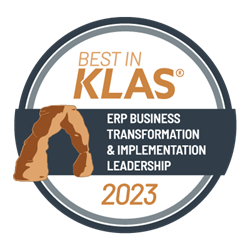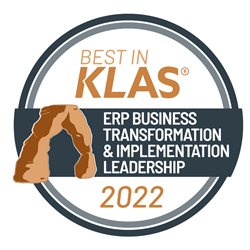In Brief
“Right product, right place, right time” has been the objective of supply chain for years. That mantra still rings true, but more is at stake now in a value-based, consumer-centric environment. While supply chain is recognized for its importance in cutting back costs, many organizations fail to see the critical role it plays in advancing — or hindering — transformation of quality, cost and productivity.


Healthcare organizations continue to invest heavily in functional areas that will advance strategies tied to digitization, consumerism, data analytics and growth of new and different services. As a strategic application, however, supply chain in healthcare has struggled to keep pace.
Leaders continue to underinvest in modernizing their supply chain operations. Organizations are not demanding the right outcomes from their supply chain, which means they are not realizing its full value. Healthcare leaders need to see the bigger potential of modern supply management to reposition their business operations and care delivery for a successful future.
Setting the Supply Chain Strategy
Much of the delay in the evolution of supply chain stems from a lack of growth strategy specific to supply chain and a misalignment to the organization’s broader strategic plan. Supply chain leaders are rarely at the table when decisions are made about organizational technology investments, mergers and acquisitions, or service line growth.
The absence of supply chain in strategic conversations puts functional leaders in a position of playing catch-up instead of strategizing how they will evolve their systems and people alongside other initiatives. Especially when decisions involve growth and expansion, it’s imperative that supply chain leaders understand the new delivery models that will allow them to scale operations while achieving continuous improvement.
In a value-based environment, supply chain has to evolve in lockstep with broader strategic initiatives for organizations to achieve growth, efficiency and cost effectiveness. Supply chain leaders should be optimizing current systems while looking ahead five or even 10 years at how supply chain can be a strategic transformation partner to the overall enterprise.
Modernizing Supply Chain: People, Process and Technology
There is a marked difference in how supply chains function in healthcare today due to overall industry disruption and advances in technology and data analytics. The mentality around people, process and technology has shifted. It’s no longer about placing orders and moving boxes. Supply chain is now an information-based function.
As is true for any disrupted industry, the skill sets needed to do the job yesterday are not the skill sets needed for tomorrow. Leaders have to change the conversation from concern about staffing their current operating model adequately to questions about whether they have the right skill sets to run new, data-driven operating models. That means more leaders with the skills to look at the supply chain holistically and innovate with an eye toward delivering breakthrough results in productivity, cost and quality.
Long-standing supply chain processes are being disrupted to create more value. Organizations can expect to see more emphasis on channel optimization, which lowers administrative costs and streamlines operations by funneling products through fewer vendors. Business relationships with prime distributors are changing to create efficiencies as they distribute an increasing number of physician preference items (PPI), which previously would have come direct from multiple manufacturers. Distributors may also store inventory to be dispersed in low unit measures directly to the healthcare facility, freeing up physical storage space for the healthcare system and reducing waste caused by unnecessary bulk orders. This becomes particularly valuable as healthcare organizations expand their ambulatory presence and take on more facilities across expanding geographic markets.
Forward-thinking leaders need to think beyond the capabilities of typical enterprise resource planning (ERP) systems and be aware of advanced tools and data available to them for better decision making and efficiency. For example, in a procure-to-payment process, robotic process automation (RPA) is changing how organizations match and batch vendor payments. RPA technology can reconcile purchase orders, receiving documents and invoices, and then schedule immediate vendor payments for orders without errors. Exception reports can be generated, and staff time is freed up to more quickly resolve complex order/payment issues. The new process further incentivizes vendors to improve accuracy, knowing they will be paid faster through automation for correct orders.
Data and technology are also changing how supplies are replenished. No longer do organizations have to rely on manual observation or hand-held scanners to track inventory. Predictive analytics can project how many products will be needed at a given time. Technology such as weighted bins and cameras paired with artificial intelligence can manage inventory quantities in real time.
Monetizing Supply Chain
More sophisticated systems can move to yet another level of value by generating revenue from their supply chain. From optimizing equipment utilization to helping create clinical and service line integration, organizations are finding ways to not only reduce waste but contribute to organizational growth.
Another relationship changing quickly in healthcare supply chain is that of group purchasing organizations (GPO). In the past, GPOs have offered leverage to healthcare facilities through the aggregation of purchasing volume. Today, for systems with the right organizational structure and supply spend, self-GPO models offer a return on investment worth the initial startup challenges.
Where incremental price reductions were once a sufficient output of supply chain operations, today’s supply chain must go further to contribute to an operating model that delivers breakthroughs in cost, quality and efficiencies for the entire enterprise across the continuum of care.
KEY TAKEAWAYS
-
Think differently.
Adopt a mindset rooted in data-driven decisions that transform supply chain operations across the continuum of care. -
Plan differently.
Develop a specific supply chain strategy that keeps pace with the growth and transformation priorities of the larger organizational strategic plan. -
Act differently.
Evolve people, process and technology to reflect modern supply chain operating models suited for a value-based, consumer-centric healthcare environment.
